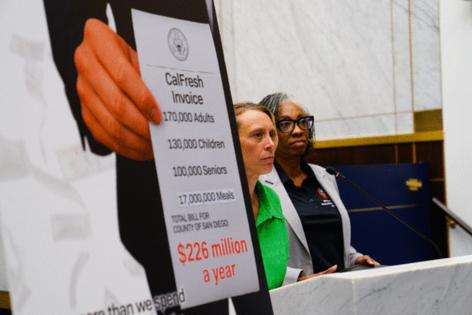How GOP's 'big, beautiful bill' could blow a $286 million hole in San Diego County's budg
Published in News & Features
SAN DIEGO — Changes to Medicaid, food stamps and more proposed in President Donald Trump’s “big, beautiful bill” would put San Diego County on the hook for at least $286 million a year to keep those services going and comply with new federal rules, setting off big questions about how the county will care for hundreds of thousands of residents who rely on them.
Fresh estimates from county staff show the version of Trump’s marquee spending legislation passed by the House of Representatives last month would saddle the county with costs well beyond what it can afford, a situation Democratic supervisors warn will curb access to health care and food for low-income San Diegans.
“This is not a hypothetical situation,” Supervisor Monica Montgomery Steppe said. “HR 1 represents one of the most aggressive federal disinvestments in core safety net programs in decades.”
Currently, the federal government covers the cost of the Supplemental Nutrition Assistance Program, or SNAP — also known as food stamps, or CalFresh in California. But if the bill passes as is, certain counties would have to shoulder 25%.
That change would cost San Diego County $226 million, plus about $50 million in related administrative costs. About 400,000 people in the county get food assistance through CalFresh, including 130,000 children and 100,000 seniors.
And proposed new work requirements for Medicaid, administered in California as Medi-Cal, would double the workload for county staff tasked with ensuring people comply, per a report by county staff on the potential impacts.
The county does not yet have estimates for the jump in staff costs. But for the nearly 900,000 county residents enrolled in Medi-Cal, wait times are expected to grow as residents face more paperwork and bureaucratic hurdles.
The county’s ongoing budget woes could exacerbate the overload.
Even as Republicans in Washington are set to subject local Medicaid administrators to more regulation, county supervisors are poised to pass a budget Tuesday that cuts 44 vacant positions of the very staff who oversee Medi-Cal eligibility.
That’s because in an effort to balance the county’s budget and close what had been a projected $139 million gap, county administration identified vacant positions to cut. The 44 jobs in the county’s health agency were among them.
In an interview, Supervisor Terra Lawson-Remer said the county explored keeping those positions on the books, but it would have meant defunding other areas of county services.
To Lawson-Remer, the scenario underscores the need to bring in more revenue and change how the county calculates its reserves, freeing up existing cash.
“What could the reserves help with? These kinds of things,” Lawson-Remer said. “It’s bridge funding. It’s not a solution. You could tap the reserves for a year or two so you don’t have to cut those folks while you put together a longer-term solution.”
As for revenue, Lawson-Remer has floated a 1% tax on the sale of high-value real estate but says she’s not committed to any one idea. “I’m in the ‘sound the alarm’ phase,” she said. “Now what is the solution? My door is open.”
The Trump-backed Republican spending bill is currently being considered in the U.S. Senate, where Republicans have this week appeared poised to maintain the Medicaid work requirements endorsed by the House.
But on local cost-sharing for food stamps, the Senate version differs from what the House passed. In both, the local share is based on each state’s error payment rate — meaning the rate at which food stamp recipients are paid either too much or too little. California’s rate in 2023 was about 13%, just above the national average of 12%.
In the House bill, states with an error rate above 10% would have to cover 25% of costs. In the Senate bill, they would have to cover 15%.
To get ahead of the bill’s potential impacts, Lawson-Remer and Montgomery Steppe have proposed a measure to direct county staff to further analyze county services most at risk. The Board of Supervisors is scheduled to vote on the measure Tuesday.
Under their proposal, by September staff would have to develop a plan for how the county would cover its new share of costs. That plan would have to offer revenue options, including tapping the county’s unassigned reserves, local philanthropy, grants and intergovernmental cost-sharing.
“Our plan is to certainly hope for the best and plan for the worst,” Montgomery Steppe said on Wednesday. “If our core responsibility is to provide health and human services to San Diego County residents, we need to respond with urgency and common sense.”
The “big, beautiful bill” is not the only piece of legislation on the horizon that could seriously disrupt government programs used by San Diegans.
County staff also analyzed the proposed budget Trump released in early May, which contained a 44% cut to U.S. Department of Housing and Urban Development programs.
In San Diego, county staff estimated that just over 200 households who were recently homeless would lose access to emergency housing vouchers.
Trump’s budget also proposes eliminating a HUD program that gives long-term rental assistance to people with HIV/AIDS. About 140 San Diego households rely on that program.
The federal government isn’t the only source of uncertainty. Sacramento is, too.
Changes to in-home supportive services coming from the state would cap overtime hours for providers and restrict access for undocumented immigrants.
County staff did not estimate how many residents would be affected but said about 34,000 local in-home care providers would be.
©2025 The San Diego Union-Tribune. Visit sandiegouniontribune.com. Distributed by Tribune Content Agency, LLC.







Comments